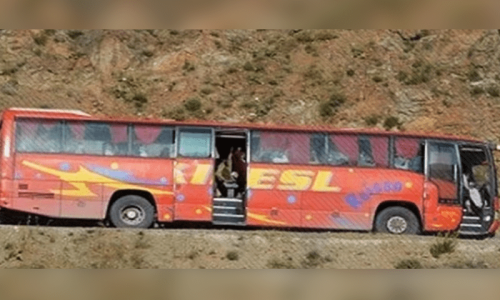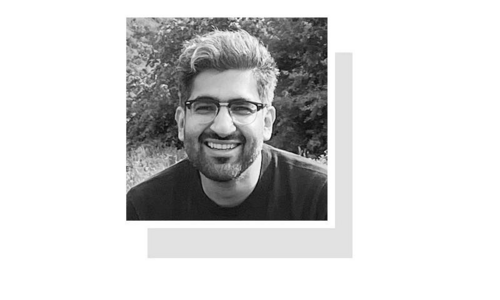 |
| — Photo by writer |
LEGEND has it an elderly pir stopped at a village handpump in Shikarpur district to prepare for prayer. Two pregnant women passing by were mortified to see he had only one finger on each hand and sniggered at him. The pir looked up and said to the women: you are snickering now but when you deliver the babies you are carrying don’t forget to laugh at home too.
That was six generations ago. Till today, children in Mahmood Panhwar village near the town of Rustum, about 15 kilometres from Shikarpur city, are often born with either one or two fingers on each hand and deformed feet as well.
According to Mohammad Ali, the landlord and village elder, there are one or two afflicted people in at least 50 of the 200 homes in the settlement. All belong to the Panhwar clan.
The village, a collection of a few dusty streets, a rickety confectionery store and an unkempt government primary school, is nestled amid paddy fields and gardens of bitter gourd. It’s a strange and eerie hamlet with a desolate feeling one can’t quite place. Unlike other villages all across the area, it isn’t bustling with life. I didn’t see a single farmer heading to work in the morning or a customary tea shop or any buffaloes soaking in ponds. Other than the odd woman churning butter, no other signs of life were visible. Children didn’t chase after our car or giggle at strangers and offer to shake hands the way they normally do and women didn’t peer eagerly out of their houses to invite female visitors in. Instead, women and children looked sullen and wary.
Some put this down to the feeling of shame among those afflicted with the hand and foot deformities. Somehow, I couldn’t quite put my finger on it.
Faiz Mohammad, a 90-year-old resident who has one finger on each hand, said his maternal grandfather was the first person to be born with this disease in the village. Faiz Mohammad himself studied up to class seven but was denied a government teaching job after being declared unfit due to the deformity, he said. To this day, according to Faiz Mohammad, pregnant women visit a follower of the pir seeking relief and if she makes visits three Mondays in a row, her children are born normal.
“I’m 90 and I’m still seeing children being born this way, I don’t know if it will ever end,” he said.
People in the village said only the children of women in the lineage are afflicted with the condition. When men have married outside the Panhwar clan, their children have been born normal. Not a single woman from the family has married outside. According to the legend, when villagers sought mercy after the first children were born deformed, the pir deigned that only the children of women from the clan would be born this way while he would spare the kids of Panhwar men.
Women swept their courtyards and filled water from handpumps, holding onto the bucket with one or two fingers. They fanned their children with hand fans and cooked holding the ladle with a single finger.
“We do all the housework we can but it’s very difficult at times,” said Mansia, a young woman with two fingers on each hand. Her sister Aasia, also afflicted, was too conscious to talk about how the condition affected her and only managed a faint smile.
Outside their home, Karamullah, a 50-year-old shopkeeper, sat on steps writing his day’s sale using his single finger. Beside him a basket of fresh okra and a few jars of candy were up for sale.
“We can’t do even a fourth of the work a normal man does,” he said, sitting at his small roadside shop. A boy of about 11 or 12 with one finger on each hand, stopped to make a purchase from the roadside stall.
Doctors I shared photographs with smiled at the story of the pir and confirmed this was a type of congenital disease that would only end once intermarriages in the family were stopped.
Otherwise, they said, there was no cure.
When I asked villagers if they’d consider getting their girls married outside the Panhwar clan, they counter-questioned me: “Is there anyone you know who would accept these girls the way they are? They’re not even able to cook a chapatti.”
Some children’s hands appeared fixable by plastic surgery; some had an extra lifeless thumb and some had two fingers joined together. Villagers complained that television channels had, over the years, visited, made video recordings and promised aid that never came through. The village elder said one district official had even threatened to lock up the afflicted people for continually asking for financial assistance.
The village is in need of life. If a small counselling effort is started to explain congenital disease and discourage intermarriages, that may help. Additionally, vocational training to give affected people skills they can learn and use to make a living may reduce their need for aid and dependence.
In a lane towards the end of the village, Zulaikha, an elderly lady sat wheezing on a bed in an airless room. Her hands and feet were deformed as well.
“I have found it difficult all my life to get anything done, anything simple like milking a buffalo,’’ she said. “My life has passed away. But at some time surely God will take mercy upon us.”
The writer is a journalist and founder of Ali Hasan Mangi Memorial Trust.
Published in Dawn, July 5th, 2015
On a mobile phone? Get the Dawn Mobile App: Apple Store | Google Play









































